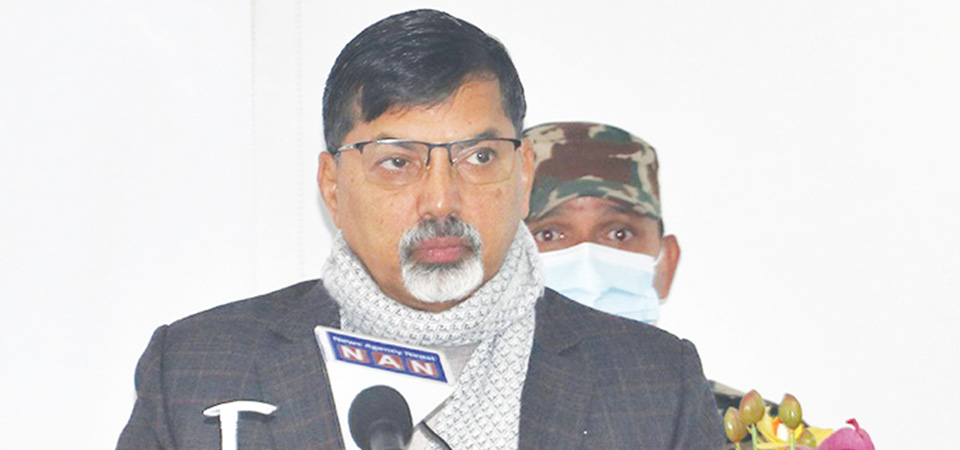Strong institutions key to economic progress: Sharma

By A Staff Reporter
Kathmandu, Mar. 30: Finance Minister Janardan Sharma said that weak institutions are the main cause for poor development and economic progress.
“Institutional strengthening should be our focus. They should be strong in transparency, programme implementation and meeting the demands of the people,” he said while addressing an interaction on ‘current economic status and forthcoming budget of fiscal year 2022/23’ jointly organised by Nepal Economic Association (NEA), Confederation of Banks and Finance Institutions Nepal (CBFIN) and Ministry of Finance (MoF) on Tuesday.
Minister Sharma stated that the country has not achieved the economic and political stability that it envisioned which has multiple repercussions on development and resource mobilisation.
According to him, foundation for development can be created by mobilising resources, labour, capital available in the country. “We must think beyond the customs-based revenue, it is not sustainable,” he said, adding that finding solution to the ongoing challenge created by the international crisis is the responsibility of all.
He pointed to the need of research-based policy instead of copy-paste documents to promote development and spur growth. Without innovation, there won’t be any progress, he said.
He said that Nepal should consume at least 10,000 MW electricity and make sustainable export growth.
Prof. Dr. Bishwambher Pyakuryal, President of NEA, said that by the end of this fiscal year, it would be difficult for Nepal to save it from the double-digit inflation. “Therefore, the government and other stakeholders should immediately discuss and find ways to check it,” he said.
Inflation is high in the entire south Asian region which will create additional challenges in containing inflation in the part of Nepal.
According to Prof. Pyakuryal, export is not reliable as it is based on customs arbitrage but South Indian states are saying that the imports of palm oil and soyabean oil have hurt their local business and industry. Nepal’s export is boosted due to the export of palm oil and soyabean oil which are dependent on imported raw materials.
Prof. Pyakuryal also said that capital flight is a matter of serious concern, greater concern is that neither the MoF nor Nepal Rastra Bank knows about it, they don’t have any data on it.
Economist Keshav Acharya suggested government to maintain storage of food and essential goods in case economic crisis hit the country. He suggested that agricultural grant should be provided on inputs and seeds.
Likewise, he maintained that Nepal should review the pegged exchange rate with Indian currency. Global scenario and Indian economic status have changed a lot since the two countries pegged their currencies about three decades ago.
Increasing the customs duty on electric vehicle and reducing tax on the goods like chocolate is unfavourable, said Acharya.
“Development Administrative Group should be formed at the MoF to mobilise the capital budget. We have an experience of increased revenue collection after the formation of Revenue Administrative Group in the past,” he said.
Economist Dr. Govinda Nepal said that basic health infrastructure and telemedicine are needed in all local bodies, and investment should be made on programmes supporting to develop these facilities.
Similarly, he suggested a thorough study on systemic corruption and stressed on information economy.
Dr. Posh Raj Pandey, trade expert and former member of the National Planning Commission, criticised the MoF for being revenue focused rather than development-focused.
About Rs. 1,359 billion revenue is expected, and about 49 per cent revenue is based on import and tax on imported items. If the country is to meet the revenue target, it should witness Rs. 2000 billion tax deficit, he said.
“Social security, social assistance and labour market intervention are the tools to distribute the hard-earned revenue to influence the voters. There are more than 40 social assistance programmes, and 4 labour market assistance programmes in the country,” he said while asking is this social security model sustainable?
According to Dr. Pandey, senior citizen allowance is provided to the people of higher class because most of the poor people do not live up to the age of 70 years.
Finance Secretary Madhu Kumar Marasini said that external sector has created pressure on the economy and the upcoming budget will try to address the challenges.
Likewise, Dr. Surendra Uprety, Economic Advisor to the Finance Minister, maintained that private sector lending has increased which will contribute to job creation and economic growth.
Stating that Nepal has imported agricultural goods worth Rs. 325 billion in the last fiscal year, he said that the country should adopt measures to control the import of agricultural goods,.
Pawan Kumar Golyan, President of CBFIN, said that customs rates should be increased and anti-dumping measures should be strictly implemented to save and flourish domestic industries.
There should be at least 4 per cent difference in the interest rates on credit to manufacturing and trading sector, he said.
Recent News

Do not make expressions casting dout on election: EC
14 Apr, 2022
CM Bhatta says may New Year 2079 BS inspire positive thinking
14 Apr, 2022
Three new cases, 44 recoveries in 24 hours
14 Apr, 2022
689 climbers of 84 teams so far acquire permits for climbing various peaks this spring season
14 Apr, 2022
How the rising cost of living crisis is impacting Nepal
14 Apr, 2022
US military confirms an interstellar meteor collided with Earth
14 Apr, 2022
Valneva Covid vaccine approved for use in UK
14 Apr, 2022
Chair Prachanda highlights need of unity among Maoist, Communist forces
14 Apr, 2022
Ranbir Kapoor and Alia Bhatt: Bollywood toasts star couple on wedding
14 Apr, 2022
President Bhandari confers decorations (Photo Feature)
14 Apr, 2022











